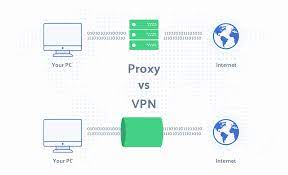Understanding the Basics: VPN vs Proxy
In today’s digital era, where online security and privacy are paramount, understanding the tools at your disposal is essential. Two such tools are Virtual Private Networks (VPNs) and Proxies, each offering distinct ways of accessing the internet securely and anonymously. At their core, both VPNs and Proxies act as intermediaries between your device and the internet, but they do so in markedly different ways with varying implications for privacy, security, and functionality.
VPNs: Secure and Private Internet Access
VPNs create a secure and encrypted tunnel between your device and a remote server operated by the VPN service. This tunnel ensures that all data traveling between your device and the internet is encrypted, making it unreadable to anyone who intercepts it. This encryption is crucial for protecting sensitive information, especially when using public Wi-Fi networks.
Advantages of Using a VPN:
- Enhanced Privacy and Anonymity: By masking your IP address, VPNs keep your online activities private.
- Strong Encryption: VPNs use advanced encryption protocols to secure your data, protecting it from hackers and snoopers.
- Access to Geo-Restricted Content: VPNs can bypass geographical restrictions, allowing access to content from different regions.
Proxies: A Gateway to the Internet
Proxies, on the other hand, act as a gateway between your device and the internet. They redirect your internet traffic through a different server, changing your IP address and location. Unlike VPNs, most proxies do not encrypt your data, 마나토끼 meaning they offer less security but are often faster and more suitable for simple tasks like bypassing geo-restrictions or filtering content.
Benefits of Using a Proxy:
- IP Masking: Proxies hide your real IP address, offering a degree of anonymity.
- Faster Speeds: Due to the lack of encryption, proxies can provide faster connection speeds.
- Content Filtering: Proxies can be configured to block certain types of content, useful in organizational settings.
Comparing VPN and Proxy: Security Aspects
When it comes to security, VPNs have a clear edge over proxies. The encryption provided by VPNs is crucial in protecting your data from cyber threats like hacking and identity theft. Proxies, while useful for bypassing content filters or geo-restrictions, do not offer the same level of security and are more susceptible to security breaches.
VPN and Proxy for Online Privacy
In the realm of online privacy, VPNs again stand out. They not only conceal your IP address but also ensure that your browsing activities are not visible to anyone, including your internet service provider (ISP). Proxies provide a basic level of privacy by hiding your IP address but do not protect your browsing activities from being monitored.
Performance and Speed: VPN vs Proxy
The impact on internet speed is another area of comparison. VPNs might slow down your connection slightly due to the encryption process, but this is a small price to pay for enhanced security. Proxies, offering no such encryption, typically allow for faster browsing speeds, making them suitable for tasks that require less security but higher speed.
Accessibility and Content Unblocking
Both VPNs and proxies can be used to access geo-restricted content. However, VPNs are generally more reliable in this regard. Some streaming services have started blocking IP addresses known to belong to proxy servers, whereas VPNs, with their broader range of servers and stronger privacy features, are often more effective in bypassing these blocks.
The Right Choice for Different Needs
Choosing between a VPN and a proxy ultimately depends on your specific needs:
- For users prioritizing security and privacy, a VPN is the preferable choice.
- For those needing to quickly bypass geo-restrictions or content filters without requiring robust security, a proxy may suffice.
Conclusion: Balancing Security, Privacy, and Speed
In conclusion, while both VPNs and proxies offer ways to access the internet anonymously, they cater to different needs in terms of security, privacy, and speed. Understanding the differences between these tools is key to making an informed choice that aligns with your specific internet usage requirements.
